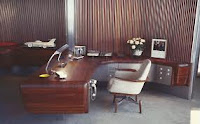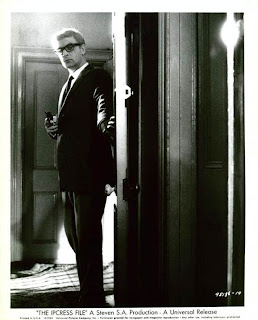My groups
(Lucie Nakach, Sacha Stevenson, Martin Wilby, Ian Wisbey & Callum Wilson)
initial ideas and research for this unit has led us to look at the theme '1960s
thriller/action films'.
We first
created a series of mood boards:
We first
inspired by bond particularly the image of Shirley Eaton's character painted in
gold lying dead on the bed, as it is very dramatic and eye catching.
We began
looking into more bond films of this era but found it too limiting the idea was
not very unique and could not, on its own be taken very far; the only thing an
audience thinks of when watching a Bond film is suave, sophistication, tuxedos,
glamour etc.
Therefore
we started to spread out into the thriller/action genre in general looking at
films and how they were interpretated in different societies- English, European
& American. We looked at the following films:
English-
Bond, Get Carter, Alfie, The Avengers, Tinker Tailor Soldier Spy
European-
Breathless, Persona
American-
Bonnie & Clyde, North by Northwest, Chinatown, Mad Men
This led
us to explore the characters in the films and how they were portrayed by very
prominent actors of the time, looking particularly at the fashion &
characterisation in the 1960s.
Strong
male characters:
English-
Sean Connery, Michael Caine
European- Jean Paul Belmondo
American- Jack Nicholson, Warren Beatty, Steve McQueen, Cary Grant
Strong
female characters:
English-
Honor Blackman, Tania Mallet
European-
Jean Seberg, Monica Vitti
American-
Faye Dunaway, Eva Marie Saint
As a
group we began to look at fashion shoots inspired by these films, Callum found
a fashion shoot inspired by Bonnie & Clyde which has thrown up some
interesting ideas for set design, props, use of colour & casting.
I also
found a Bond inspired fashion shoot- Joop FW 2010 campaign which focusses on
the sophisticated side of our research, also throwing up ideas for our set
design, fashion & casting.
 We wanted
to look at the history & background of spies to explore how they really
looked and what sort of things they did. Lucie found the majority of real spies
werer actually female rather than male contrary to the portrayal of spies in
films including Bond. Women in Bond films are often glamorous and are working
for the 'bad guys' and entice Bond but then turn on him which reflects this
idea that more spies are women. Some of the spies are quite glamorous such as
Mata Hari, who was a stripper who toured European cities becoming courtesan of
powerful men in government & the military; this has a similar feel to Bond
films.
We wanted
to look at the history & background of spies to explore how they really
looked and what sort of things they did. Lucie found the majority of real spies
werer actually female rather than male contrary to the portrayal of spies in
films including Bond. Women in Bond films are often glamorous and are working
for the 'bad guys' and entice Bond but then turn on him which reflects this
idea that more spies are women. Some of the spies are quite glamorous such as
Mata Hari, who was a stripper who toured European cities becoming courtesan of
powerful men in government & the military; this has a similar feel to Bond
films.
As an
agent of Britain’s Special Operations Executive, Virginia Hall executed
countless missions in support of the French Resistance, earning a reputation
for being able to elude even the tightest Nazi dragnets. Again giving the feel
of 60s espionage films where the women often get the upper-hand over men. Hall
was even more impressive by the fact that she’d lost part of her leg in the
1930s, and walked on a wooden prosthesis.
Klaus
Fuchs was a German-born theoretical physicist who worked in Los Alamos on the
atom bomb project.Whilst attending university in Germany, Fuchs became involved
with the Communist Party of Germany. After a run-in with the newly installed Nazi
government, he fled to England where he earned his PhD in physics. For a short
time he worked on the British atomic bomb project. While he was working for the
British he began to give information to the Soviets. He reasoned that they had
the right to know what the British and the Americans were developing.
 Aldrich Ames is a
former CIA Counter-intelligence Officer who was convicted of spying for the
Soviet Union, on his first assignment as a case officer, he was stationed in
Ankara, Turkey, where his job was to target Soviet intelligence officers for recruitment.
Due to financial problems in his personal life as a result of alcohol abuse and
high spending, Ames began spying for the Soviet Union in 1985, when he walked
into the Soviet Embassy in Washington to offer secrets for money.
Aldrich Ames is a
former CIA Counter-intelligence Officer who was convicted of spying for the
Soviet Union, on his first assignment as a case officer, he was stationed in
Ankara, Turkey, where his job was to target Soviet intelligence officers for recruitment.
Due to financial problems in his personal life as a result of alcohol abuse and
high spending, Ames began spying for the Soviet Union in 1985, when he walked
into the Soviet Embassy in Washington to offer secrets for money.
I was
given the main task of exploring different film sets that were filmed or set in
the 1960s; it was interesting exploring the different aspects such as the
wallpaper and different living areas eg. bedroom, front room etc. It was
interesting to explore the different styling in films such as Austin Powers,
Bond, Mad Men & Tinker Tailor Soldier Spy.
When looking at particular ideas we finalised on a couple of different scenes from movies that we found interesting; the first image was from 'The Ipcress File' where Michael Caine stands in a doorway with light casting shadows in the hallway behind.
We also
really liked the use of guns in this next scene taken from the episode 'The
Charmers' from the series 'The avengers'; it's very eye-catching and gives the
feeling of strength & power. The scenario has also intrigued us the way
that the roles of powerful men and weak women has been reversed with the woman
stood physically higher up and having the upper hand to the male figure.
A still
from the film 'The Christine Keeler Affair' depicts a woman framed by a window
which we as a group really liked; although quite simple it is very effective
and gives this feel of voyeurism. The simplicity of the flat wall with wallpaper
& a framed image really sets the scene in the 1960s.
At the
moment we have two ideas of lighting we are interested in; an interrogation
scene from a film is often very underlit possibly from a window or dim lighting
which creates atmosphere.
Another
idea is the use of artifical lighting as films set & based in the 60s are
often dimly lit & colour is often washed out mainly due to quality of
filming in that era however this is the view of this time and therefore I feel
this should be portrayed through our final image.
Through
research we were really intrigued by the idea of role reversal, as before the
60s the male character was seen as the strong leading figure, while during this
era the female figure begins to take over or becomes an equal role.
For
example Bonnie & Clyde, The Avengers, Chinatown, Breathless where the main
female character rather than the sex symbol is portrayed as the strong,
independent figure rather than the glamorous assistant as portrayed in the Bond
films & The Italian Job.




























No comments:
Post a Comment